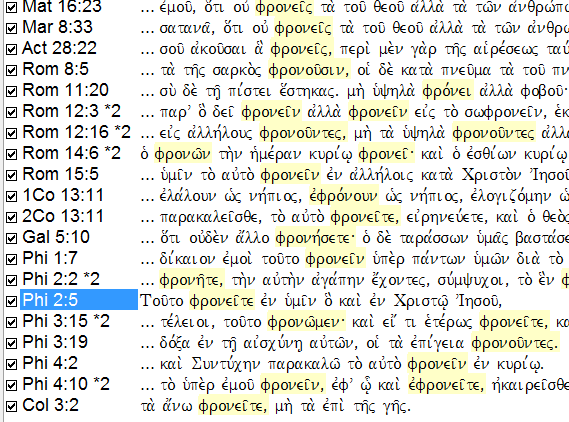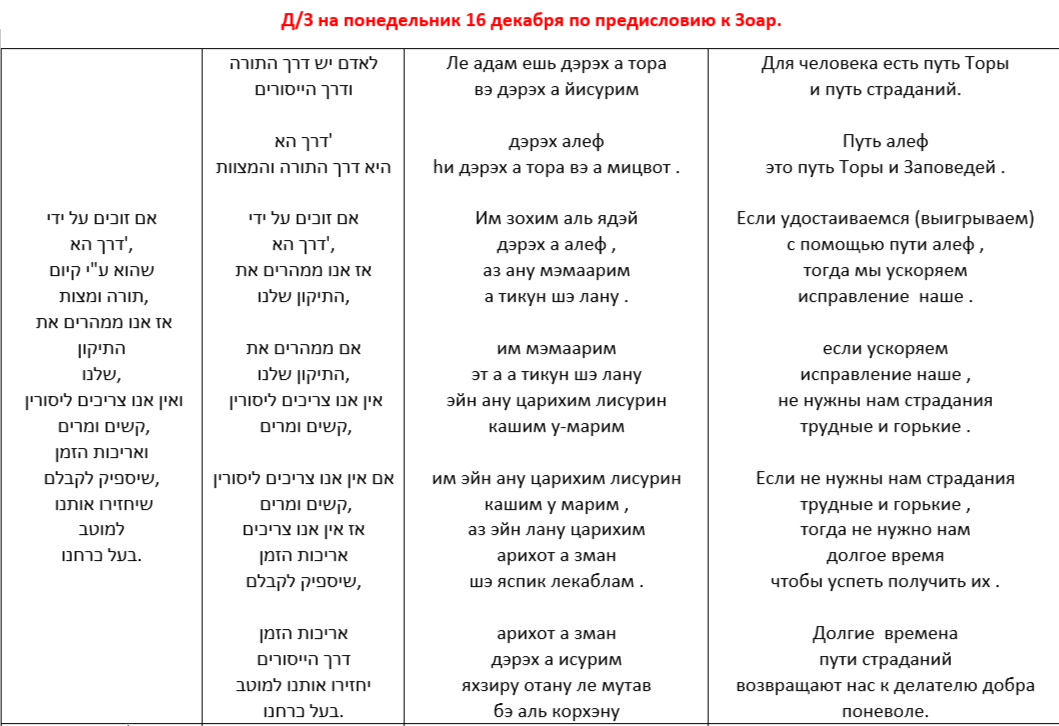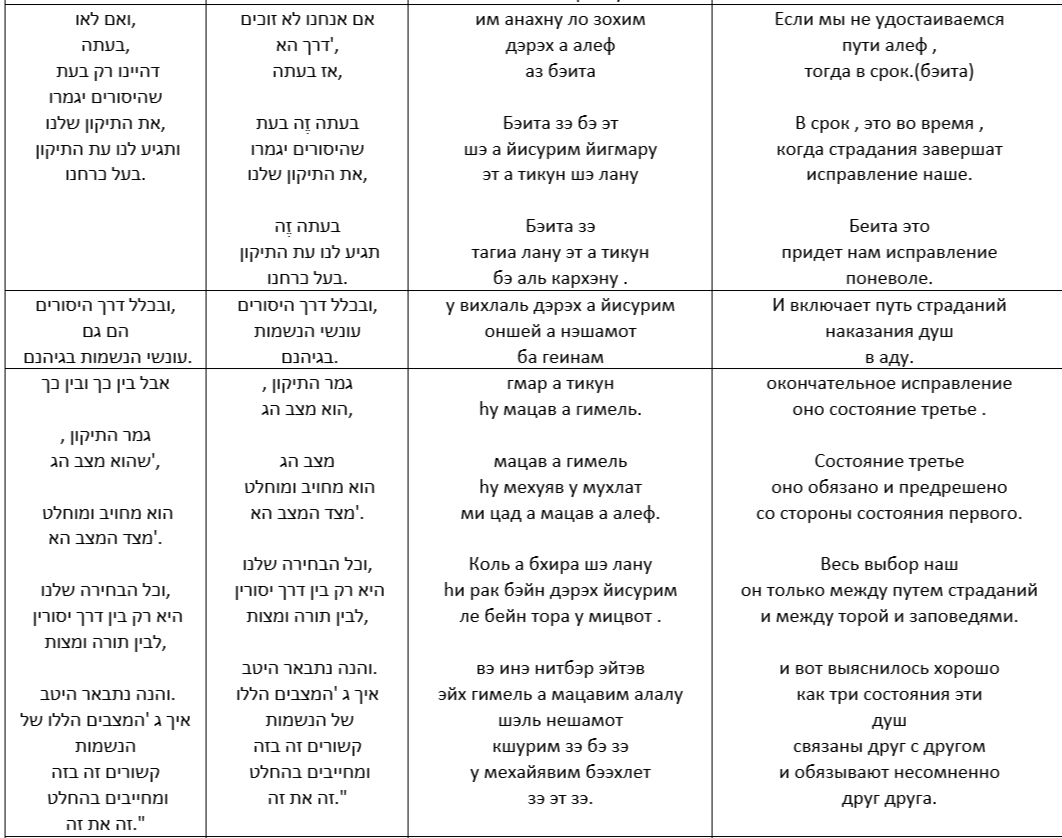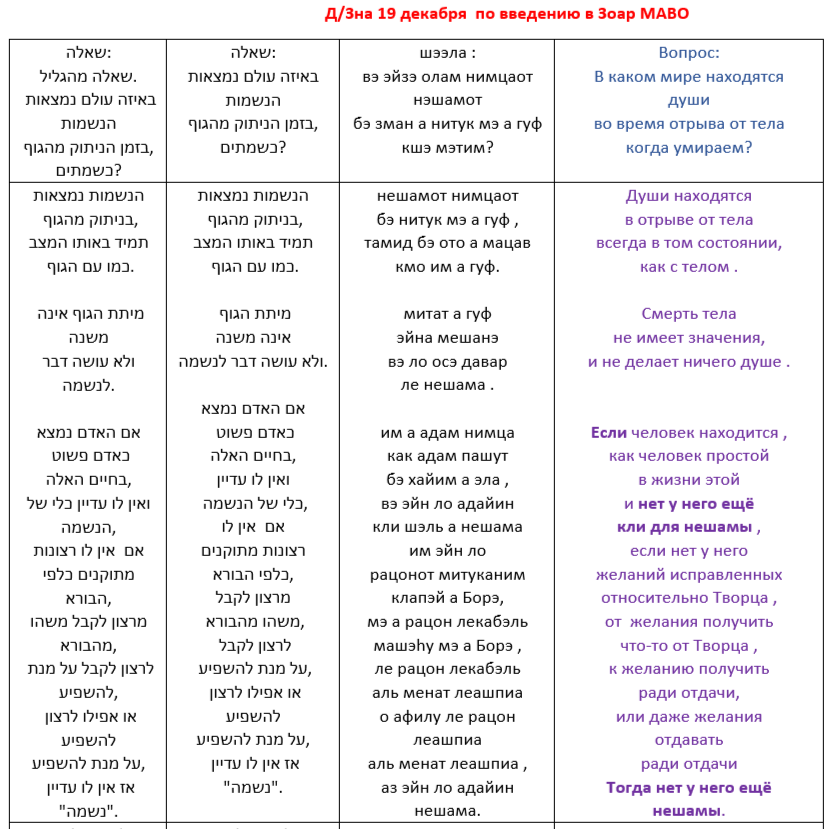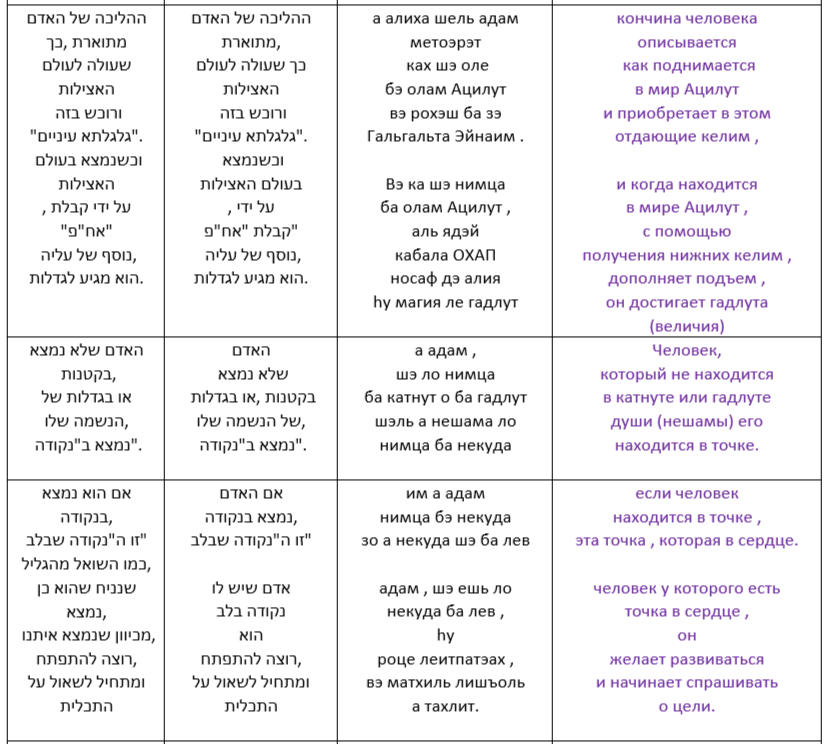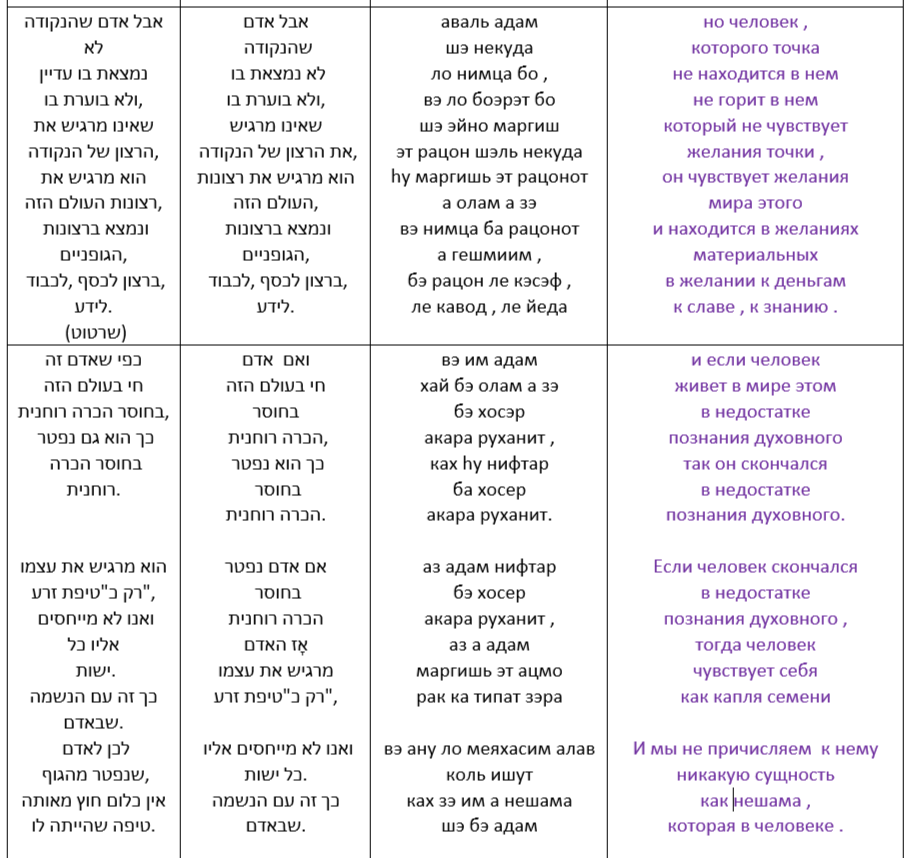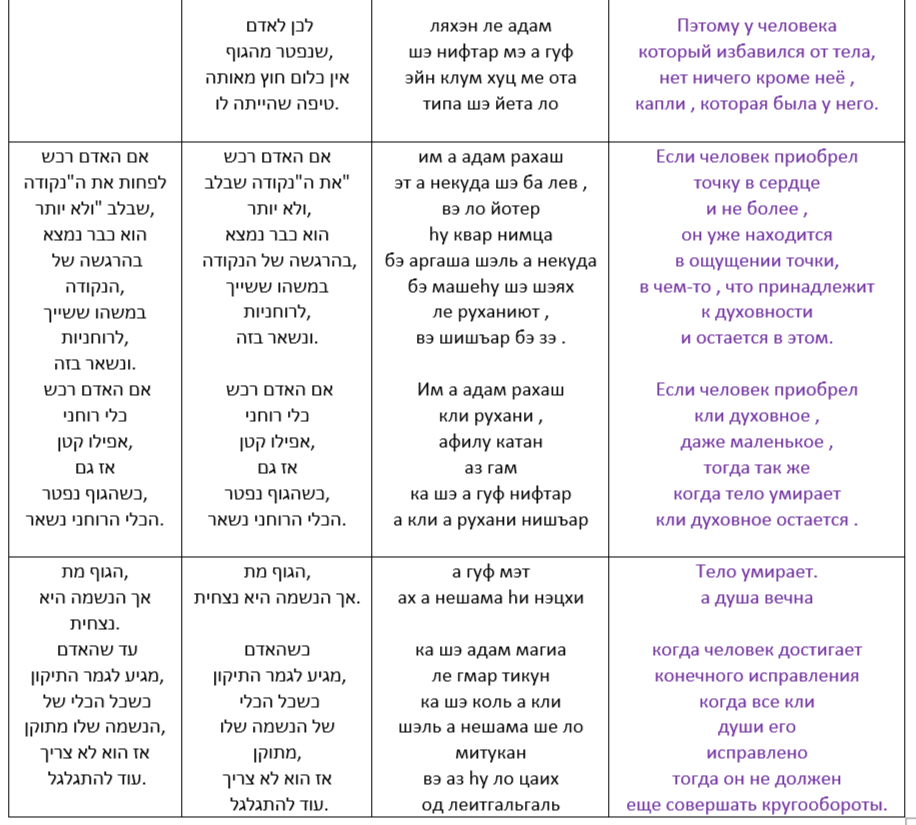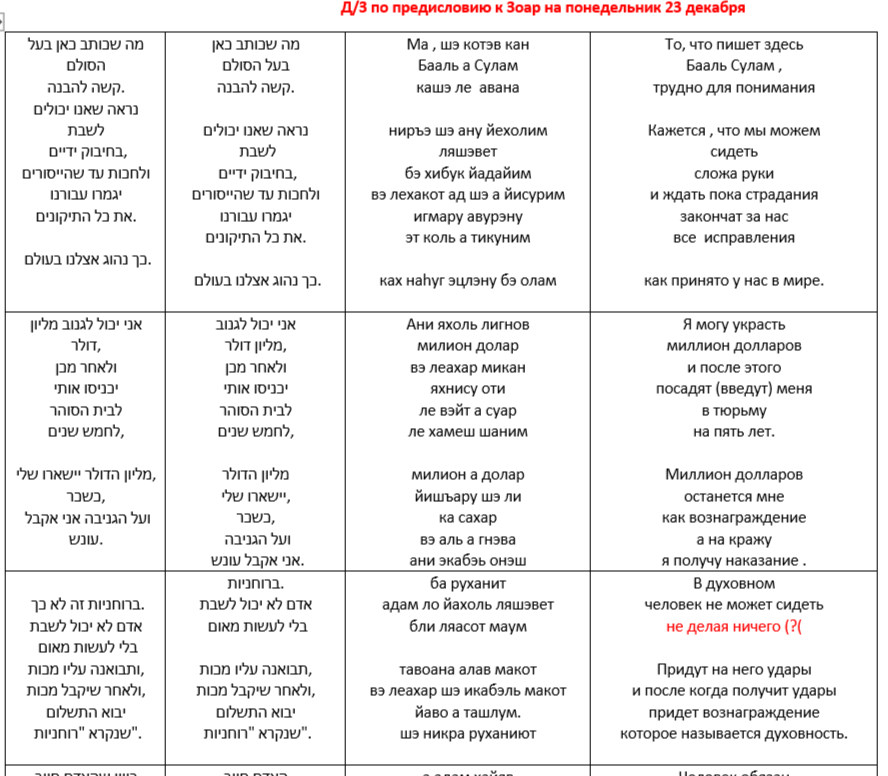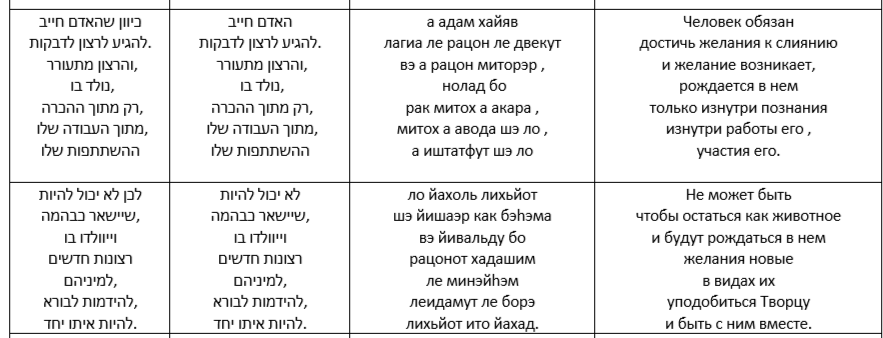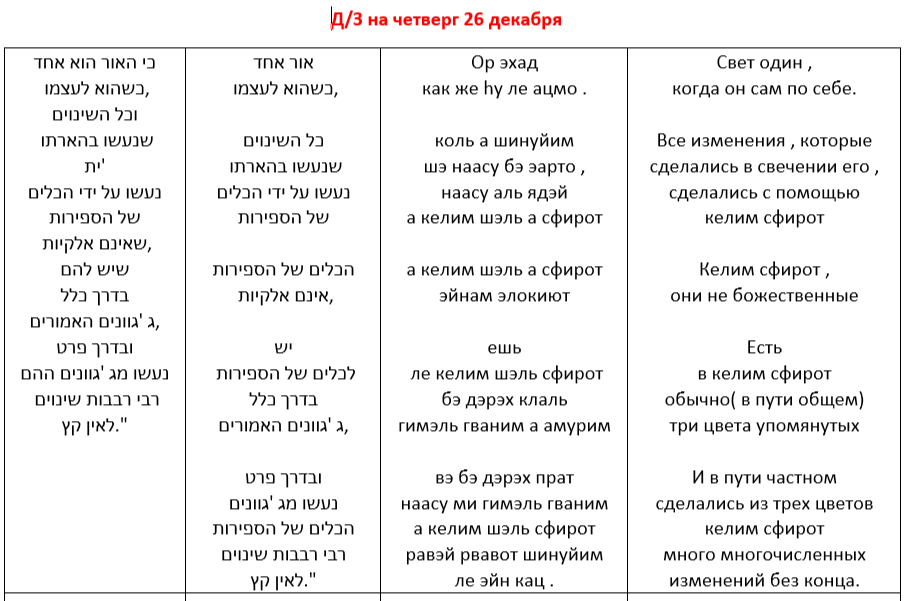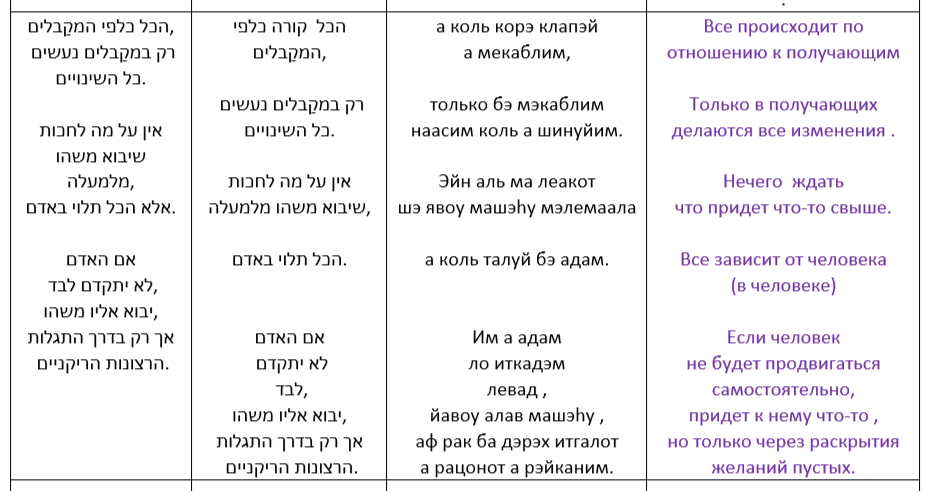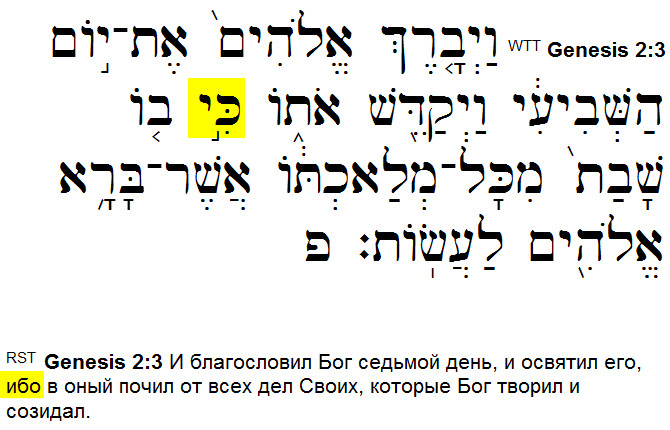כִּי particle conjunction homonym 2
BDB 4433 כִּי [4434] (Hebrew) (page 471) (Strong 3588,3588+,518)
כִּי conj. that, for, when (Moab. id,: Ph. כ. Prob. from the same demonstr. basis found in kay here, and in certain pronouns, as Aram. דֵּךְ this (W:SG 110 f.); perh. also ultim. akin with kay that, in order that, and d then, enclit., like Lat. nam in quisnam?)—1. that (ὅτι, Germ. dass): a. prefixed to sentences depending on an active verb, and occupying to it the place of an accus.: so constantly, after vbs. of seeing, as Gn 1:10 וַיַּרְא אֱלֹהִים כִּי טוֹב and God saw that it was good, 3:6, 6:2, 6:5, 12:14 + oft., hearing 14:14, 29:33, knowing 22:12, , 24:14, telling 3:11, 12:18, repenting 6:6, 6:7, swearing Gn 22:16, Je 22:5, believing Ex 4:5, La 4:12, remembering Psalm 78:35, forgetting Jb 39:15; אָמַר = command (late; in early Heb. the words said are quoted) Jb 36:10, 36:24 (זְכֹר in a command) 37:20 b, 1 Ch 21:18 (contrast 2 S 24:18) etc.; טוֹב כּי it is good that … 2 S 18:2 + (v. p. 374:b: usu. the inf. c., as Gn 2:18; v. ibid.); Gn 37:26 כִּי נַהֲרֹג מַה־בֶּצַע what profit that we should slay (impf.)…? Mal 3:14 what proft כִּי שָׁמַרְנוּ that we have kept (pf.)…? Jb 22:3 הַחֵפֶץ לְשַׁדַּי כִּי is it pleasure to Shaddai that…? after a pron., as Psalm 41:12 by this I know that thou hast pleasure in me, that my enemy cannot triumph over me, 42:5 these things will I remember…that (or how) I used to go, etc., 56:10 this I know that God is for me Jb 13:16 (הוא). And with כִּי repeated pleon. after an intervening clause 2 S 19:7, Je 26:15 +; וְכִי … כִּי Gn 3:6, 29:12, Ex 4:31, Jos 2:9, 8:21, 10:1, 1 S 31:7, 2 S 5:12, 1 K 11:21, Je 40:7, 40:11; וְכִי … לֵאמֹר Gn 45:26, Ju 10:10. b. כִּי often introduces the direct narration (like Àan and the Gk. ὅτι recitativum, e.g. Luke 4:21), in which case it cannot be represented in English (except by inverted commas), Gn 21:30, 29:33 and she said, כִּי שׁמע י׳ Yahweh hath heard, etc.; Ex 3:12 = Ju 6:16 and he said, כִּי אֶהְיֶה עִמָּ֑ךְ I will be with thee, Jos 2:24, 1 S 2:16 (v. Dr) 10:19 and ye have said to him, כִּי מֶלָךְ תָּשִׂים עָלֵינוּ Thou shalt set a king over us, 2 S 11:23, 1 K 1:13, 20:5, Ru 1:10, cf. 2:21 (but in reply to a qu. כִּי may = because, v. sub 3; and so also in sentences giving the expl. of a proper name, Gn 26:22, 29:32 (but De surely: v. infr.), Ex 2:10 (cf. Gn 4:25, 41:51, 41:52); in כִּי מָה, introducing an expostulation, 1 S 29:8, 1 K 11:22, 2 K 8:13, it gives the reason for a suppressed ‘ Why do you say this? ’). c. esp. after an oath חַי אָ֫נִי, חַי י׳ etc., introducing the fact sworn to, Gn 42:16 by the life of Pharaoh, אַתֶּם כִּי מְרַגְּלִים (I say) that ye are spies; but though Heb. usage prob. gave it an asseverative force, Engl. idiom does not require it to be expressed: Nu 14:22, 1 S 20:3 as י׳ liveth, כִּי כְפֶשַׂע בֵּינִי וּבֵין הַמָּוֶת there is but a step between me and death! 26:16, 29:6, Is 49:18 +; 1 S 14:44 אֱלֹהִים וְכֹה יוֹסִיף כִּי מוֹת תָּמוּת כֹּה־יַעֲשֶׂה thus may God do and more also: thou shalt surely die! 2 S 3:35, 1 K 2:23, Ru 1:17 al.—Note that כִּי when thus used is oft. repeated after an intervening clause, in order that its force may be fully preserved: Gn 22:16 f. 1 S 14:39 כִּי מוֹת יָמוּת (אִם־יֶשְׁנוֹ בְּיוֹנָתָן בְּנִי) חַי י׳ כִּי 25:34, 2 S 2:27 כִּי אָז וג׳ (לוּלֵא דִּבַּרְתָּ) כִּי, 3:9, 15:21 Qr 1 K 1:30, Je 22:24. d. כִּי is used sts. with advs. and interjs. to add force or distinctness to the affirmation which follows: (a) so esp. in אַף כִּי (v. אַף); †הֲכִי is it that…? (as a neutral interrog.) 2 S 9:1, (expecting a neg. answer) Gn 29:15 is it that thou art my brother, and shalt (therefore) serve me for nothing? Jb 6:22 is it that I have said, Give unto me? expressing surprise Gn 27:36 is it that he is called Jacob, and has (hence) supplanted me twice? 2 S 23:19 an affirm. answer is required (wh. would imply הֲלאֹ כִי): rd. prob. with the || 1 Ch 11:25 הִנּוֹ be-hold, he, etc.; † אִם־לאֹ כִּי Dt 32:30 were it not that…; † אָמְנָם כִּי Jb 12:2 of a truth (is it) that ye are the people, etc.; † אַךְ כִּי 1 S 8:9; אֶפֶם כִּי Nu 13:28 +; גַּם כִּי † Ru 2:21; † כִי הֲלאֹ 1 S 10:1 (but v. LXX Dr), 2 S 13:28; † הִנֵּה כִי Psalm 128:4; cf. Psalm 118:10-12 י׳ כִּי אֲמִילַֽם בְּשֵׁם in the name of י׳ (is it) that—or (I say) that—I will mow them down; Jb 39:27 doth the vulture mount up at thy command, וְכִי יָרִים קִנּוֹ and (is it) that it (so) makes high its nest? Is 36:19 have the gods of the nations delivered each his land etc.?…וְכִי הִצִּילוּ i.e. (Hi) and (is it) that they have delivered Samaria out of my hand? > (Ew:§ 354 c De Di) and that they have delivered Samaria out of my hand! = how much less (אַף כִּי) have they, etc.! (|| 2 K 18:34 כִּי alone, perhaps conformed by error to v:35; 2 Ch 32:15 אַף כִּי, which however does not decide the sense of the orig. וְכִי). 1 Ch 29:14 וְכִי מִי rd. ומי or כי מי (b) in introducing the apodosis, esp. in עַתָּה כִּי (chiefly after לוּלֵא) indeed then…, Gn 31:42, 43:10 for unless we had tarried כִּי עַתָּה שַׁבְנוּ surely then we had returned twice, Nu 22:33 (rd. לוּלֵי for אוּלַי); so 1 S 14:30 LXX (after לוּא), and 13:13 Hi We (לֻא for לֹא); after אִם Jb 8:6 surely then he will awake over thee, etc. (But elsewhere כִּי עַתָּה is simply for now, Gn 29:32, Jb 7:21 +; or for then = for in that case, Ex 9:15, Nu 22:29, Jb 3:13, 6:3 +). It is dub. whether כִּי אָז has the same sense: for 2 S 2:27, 19:7 the כִּי in כִּי אָז may be merely resumptive of the כִּי recitat. preceding (vid. a, c). Rare otherwise: Ex 22:22 if thou afflict him כִּי אִם־צָעֹק יִצְעַק ’tis that (= indeed), if he cries unto me, I will hear him, Is 7:9 if ye believe not : כִּי לאֹ תֵאָמֵֽנוּ indeed ye will not be established. e. there seem also to be other cases in which כִּי, standing alone, has an intensive force, introducing a statement with emph., yea, surely, certainly (Germ. ja—a lighter particle than these Engl. words): see in AV RV Ex 18:11, Nu 23:23, 1 S 17:25, 20:26, 2 K 23:22, Is 32:13, 60:9, Je 22:22, 31:19, Ho 6:9, 8:6, 9:12, 10:3, Am 3:7, Psalm 76:11, 77:12 (Ew Che), Pr 30:2 (but not if construed as RVm), Ec 4:16, 7:7, 7:20, Jb 28:1 +; La 3:22 (SyrVer Targum Ew Th &adO;t) the mercies of י׳, surely they are not consumed (rd. prob. תַמּוּ or תָֽמְמוּ for תמנו), Ru 3:12 כִּי אָמְנָם yea, indeed. But it is doubtful whether כִּי has this force in all the passages for which scholars have had recourse to it, and whether in some it is not simply = for. De:Pr 30:1 would restrict the usage to cases in which a suppressed clause may be understood. f. that, expressing consecution, esp. after a question implying surprise or deprecation: sq. perf., Gn 20:9 what have I sinned against thee כִּי הֵבֵאתָ עָלַי that thou hast brought upon me? 1 S 22:8, Is 22:1 what aileth thee, that thou art gone up, etc.? v:16, 36:5, 52:5, Mic 4:9, Hb 2:18; sq. ptcp. Ju 14:3, 1 S 20:1, 1 K 18:9 how have I sinned that thou art giving, etc.? 2 K 5:7, Ez 24:19; usu. sq. impf. Ex 3:11 who am I כִּי אֵלֵךְ that I should go, etc.? 16:7, Ju 8:6, 9:28, 2 K 8:13, Is 7:13, 29:16 (also pf.), Psalm 8:5 what is man כִּי תִזְכְּרֶנּוּ? Jb 3:12 or why the breasts : כִּי אִינָֽק that I should suck? 6:11 כִּי אִַיַחֵל מַה־כֹּחִי, 7:12, 7:17, 10:5 f., 13:25 f., 15:12 f, 15:14, 16:3, 21:15 +; after a neg., Gn 40:15 here also I have done nothing כִּי שָׂמוּ that they should have placed me in the dungeon, Psalm 44:19 f. our heart has not turned backward, etc. כִּי דִכִּיתָנוּ that thou shouldst have crushed us, etc., Is 43:22 not me hast thou called on, כִּי יָגַעְתָּ בִּי that thou shouldst have wearied thyself with me, Ho 1:6 (v. RV), Jb 41:2, Ru 1:12 I am too old to have an husband כִּי אָמַרְתִּי that I should have said, etc. (cf. Ew:§ 337 a; Dr:§ 39 δ). g. added to preps. כִּי converts them, like אֲשֶׁר, into conjs. ..., as יַעַן כִּי because that...: v. sub יַעַן, עַד, עַל, עֵקֶב, תַּחַת.
2. a. Of time, when, of the past וַיְהִי כִּי Gn 6:1 (cf. Bu:Urg. 6), 26:8, 27:1, 2 S 6:13, 7:1, 19:26 + (כַּאֲשֶׁר and esp. כְּ c. inf., are more freq.); וְהָיָה כִּי (simple וְ) 1 S 1:12, 17:48, Jos 22:7, Ju 2:18, 12:5 והיה כי יאמרו and it would be, whenever (freq.) they said, Je 44:19 (ptcp.), Ho 11:1, Psalm 32:3 כי החרשׁתי when I was silent, Jb 31:21; 31:26; 31:29; of present (usu. with impf.) as Ex 18:16 כִּי יִהְיֶה לָהֶם דָּבָר when they have a matter, 1 S 24:20, Is 1:12, 30:21, Je 14:12, Zc 7:5, 7:6, Mal 1:8, Psalm 49:19 and men praise thee לָ֑ךְ כִּי תֵיטִיב when thou doest well to thyself, 102:1, 127:5 +, with pf. Ez 3:19-21, 33:9, Pr 11:15, 23:22; esp. of future, as Gn 4:12 כִּי תַעֲבֹד אֶת־הָאֲדָמָה when thou shalt till the ground it shall not, etc., 24:41, 30:33, 31:49, 32:18, Ex 7:9 when Pharaoh shall speak unto you, Dt 4:25, 6:20 +; in phrase (תֹאמַר וג׳) תאֹמְרוּ וְכִי Lv 25:20, Dt 18:21, Is 8:19, 36:7, Je 13:22; and esp. in ... וְהָיָה כִּי Gn 12:12, 46:33, Dt 6:10, 15:16, 1 S 10:7, 25:30, Is 8:21, 10:12 + oft.; with pf. Is 16:12, 1 Ch 17:11 (altered fr. impf. 2 S 7:12); with ptcp. (unusual) Nu 33:51, 34:2, Dt 11:31, 18:9. b. elsewhere כִּי has a force approximating to if, though it usu. represents a case as more likely to occur than אִם:—(mostly with impf.) Gn 38:16, Nu 5:20, 10:32, Dt 6:25, 7:17, 28:2, 28:13, 1 S 20:13, 2 S 19:8, 2 K 4:29, 18:22, Je 38:15, Pr 4:8, Jb 7:13 (כי אמרתי when I say), 19:28; oft. in laws, as Ex 21:14, 21:33, 21:35, 21:37, 22:4, 22:5 etc., Dt 13:13, 14:24, 15:7, 15:12, 17:2, 18:6, 18:21 etc.; sometimes, in particular, to state a principle broadly, after which special cases are introduced by אִם, as Ex 21:2 when (כִּי) thou buyest a Hebrew servant, he shall serve thee six years, after which v:3-5 follow four special cases with אִם if: so 21:7 (כי), v:8-11 (אם); v:18 (כי), v:19 (אם); v:20 (כי), v:21 (אם); v:22 f; v:28-32; Lv 1:2 (כי), v:3, v:10 (אם) 4:2, 4:3, 4:13, 4:27, 4:32, 13:2 ff. Nu 30:3 ff. +; though this distinction is not uniformly observed, contrast e.g. Ex 21:5 with Dt 15:16, Nu 5:19 and v:20.—N.B. with כִּי = when or if, the subject is oft. prefixed for distinctness and emph.: 1 K 8:37 רָעָב כִּי־יִהְיֶה בָאָרֶץ דֶּבֶר כִּי יִהְיֶה וג׳, Is 28:18, Mi 5:4 כִּי־יָבאֹ בְאַרְצֵנוּ אַשּׁוּר, Psalm 62:11, Ez 3:19 (וְאַתָּה), 14:9, 14:13, 18:5, 18:18, 18:21, 33:6 (cf. v:2); and esp. in laws of P, as אָדָם … כִּי Lv 1:2; 13:2, ... נֶפֶשׁ כִּי 2:1, 4:2, 5:1, 5:4, 5:15, similarly 15:2, 15:16, 15:19, 15:25, 22:12, 22:13, 22:14 etc., rather differently Nu 5:20. c. when or if, with a concessive force, i.e. though:—(a) with impf. Je 4:30, 4:30, 4:30, 14:12, 49:16 כַּנֶּשֶׁר קִנֶּ֑ךָ כִּי־תַגְבִּיהַּ though thou make high like the vulture thy nest, I will bring thee down thence, 51:53, Ho 13:15, Zc 8:6, Psalm 37:24, 49:19 f. though in his lifetime he bless himself ... he shall come, etc., perh. also Je 46:23 Ew (but Hi Gf Ke for), 50:11 Ew Ke (Hi yea); and strengthened by גַּם, גַּם כִּי Is 1:5, Psalm 23:4 (cf. Dr:§ 143); (b) with perf. (rare) Mi 7:8 כִּי נָפַלְתִּי קָ֑מְתִּי though I have fallen, I rise, Na 1:10 (si vera 1.), Psalm 21:12 (Hi Ew Now), 119:88 (Ew De).2. a. Of time, when, of the past וַיְהִי כִּי Gn 6:1 (cf. Bu:Urg. 6), 26:8, 27:1, 2 S 6:13, 7:1, 19:26 + (כַּאֲשֶׁר and esp. כְּ c. inf., are more freq.); וְהָיָה כִּי (simple וְ) 1 S 1:12, 17:48, Jos 22:7, Ju 2:18, 12:5 יאמרו והיה כי and it would be, whenever (freq.) they said, Je 44:19 (ptcp.), Ho 11:1, Psalm 32:3 כי החרשׁתי when I was silent, Jb 31:21; 31:26; 31:29; of present (usu. with impf.) as Ex 18:16 כִּי יִהְיֶה לָהֶם דָּבָר when they have a matter, 1 S 24:20, Is 1:12, 30:21, Je 14:12, Zc 7:5, 7:6, Mal 1:8, Psalm 49:19 and men praise thee כִּי תֵיטִיב לָ֑ךְ when thou doest well to thyself, 102:1, 127:5 +, with pf. Ez 3:19-21, 33:9, Pr 11:15, 23:22; esp. of future, as Gn 4:12 כִּי תַעֲבֹד אֶת־הָאֲדָמָה when thou shalt till the ground it shall not, etc., 24:41, 30:33, 31:49, 32:18, Ex 7:9 when Pharaoh shall speak unto you, Dt 4:25, 6:20 +; in phrase (תֹאמַר וג׳) וְכִי תאֹמְרוּ Lv 25:20, Dt 18:21, Is 8:19, 36:7, Je 13:22; and esp. in ... כִּי וְהָיָה Gn 12:12, 46:33, Dt 6:10, 15:16, 1 S 10:7, 25:30, Is 8:21, 10:12 + oft.; with pf. Is 16:12, 1 Ch 17:11 (altered fr. impf. 2 S 7:12); with ptcp. (unusual) Nu 33:51, 34:2, Dt 11:31, 18:9. b. elsewhere כִּי has a force approximating to if, though it usu. represents a case as more likely to occur than אִם:—(mostly with impf.) Gn 38:16, Nu 5:20, 10:32, Dt 6:25, 7:17, 28:2, 28:13, 1 S 20:13, 2 S 19:8, 2 K 4:29, 18:22, Je 38:15, Pr 4:8, Jb 7:13 (כי אמרתי when I say), 19:28; oft. in laws, as Ex 21:14, 21:33, 21:35, 21:37, 22:4, 22:5 etc., Dt 13:13, 14:24, 15:7, 15:12, 17:2, 18:6, 18:21 etc.; sometimes, in particular, to state a principle broadly, after which special cases are introduced by אִם, as Ex 21:2 when (כִּי) thou buyest a Hebrew servant, he shall serve thee six years, after which v:3-5 follow four special cases with אִם if: so 21:7 (כי), v:8-11 (אם); v:18 (כי), v:19 (אם); v:20 (כי), v:21 (אם); v:22 f; v:28-32; Lv 1:2 (כי), v:3, v:10 (אם) 4:2, 4:3, 4:13, 4:27, 4:32, 13:2 ff. Nu 30:3 ff. +; though this distinction is not uniformly observed, contrast e.g. Ex 21:5 with Dt 15:16, Nu 5:19 and v:20.—N.B. with כִּי = when or if, the subject is oft. prefixed for distinctness and emph.: 1 K 8:37 כִּי־יִהְיֶה בָאָרֶץ דֶּבֶר כִּי יִהְיֶה וג׳ רָעָב, Is 28:18, Mi 5:4 כִּי־יָבאֹ בְאַרְצֵנוּ אַשּׁוּר, Psalm 62:11, Ez 3:19 (וְאַתָּה), 14:9, 14:13, 18:5, 18:18, 18:21, 33:6 (cf. v:2); and esp. in laws of P, as אָדָם … כִּי Lv 1:2; 13:2, ... נֶפֶשׁ כִּי 2:1, 4:2, 5:1, 5:4, 5:15, similarly 15:2, 15:16, 15:19, 15:25, 22:12, 22:13, 22:14 etc., rather differently Nu 5:20. c. when or if, with a concessive force, i.e. though:—(a) with impf. Je 4:30, 4:30, 4:30, 14:12, 49:16 כַּנֶּשֶׁר קִנֶּ֑ךָ כִּי־תַגְבִּיהַּ though thou make high like the vulture thy nest, I will bring thee down thence, 51:53, Ho 13:15, Zc 8:6, Psalm 37:24, 49:19 f. though in his lifetime he bless himself ... he shall come, etc., perh. also Je 46:23 Ew (but Hi Gf Ke for), 50:11 Ew Ke (Hi yea); and strengthened by גַּם, גַּם כִּי Is 1:5, Psalm 23:4 (cf. Dr:§ 143); (b) with perf. (rare) Mi 7:8 כִּי נָפַלְתִּי קָ֑מְתִּי though I have fallen, I rise, Na 1:10 (si vera 1.), Psalm 21:12 (Hi Ew Now), 119:88 (Ew De).
3. Because, since ὅτι—a. Gn 3:14 because thou hast done this, cursed art thou, etc., v:17, 18:20 the cry of S. and G.—because it is great ... (subj. prefixed for emph.: cf. 2 N.B.) Is 28:15; in answer to a qu., Gn 27:20, Ex 1:19, 18:15, 2 S 19:43 +. Enunciating the conditions under which a fut. action is conceived as possible (Germ. indem) Lv 22:9, Dt 4:29 כי תדרשׁנו, 12:20 (v. r), v:25, v:28, 13:19, 14:24, 16:15, 19:6, 19:9 +, 1 K 8:35 (cf. v:33 אֲשֶׁר), v:36 כִּי תוֹרֵם, Pr 4:8b. b. more commonly the causal sentence follows, as Gn 2:3 and God blessed the seventh day כִּי בוֹ שָׁבַת וג׳ because on it he rested, etc., 4:25 etc., in which case it may oft. be rendered for, Gn 2:5, 2:28, 3:20, 5:24, 6:7, 6:12, 6:13, Psalm 6:3 heal me כִּי נִבְהֲלוּ עֲצָמָ֑י for my bones are vexed, 10:14, 25:16, 27:10 + very oft. Spec. after vbs. expressive of mental emotions, as rejoicing Is 14:29, Psalm 58:11, being angry Gn 31:35, 45:5, fearing 43:18, Psalm 49:17 etc. Iron. 1 K 18:27 for he is a god etc. (4 t.); Pr 30:4, Jb 38:5 תֵדָ֑ע כִּי for or since thou knowest. With subj. prefixed Psalm 128:2. Repeated (with anacol.) Is 49:19. c. the causal relation expressed by כִּי is sometimes subtle, esp. in poetry, and not apparent without careful study of a passage. Thus sts. it justifies a statement or description by pointing to a pregnant fact which involves it, as Is 3:8 a, Jb 6:21 (ground of the comparison v:15-20), 14:16 (For…: ground of the wishes expressed v:13-15), 16:22 (ground of v:20 f.) 30:26 (For ...), or by pointing to a general truth which it exemplifies Jb 5:6 (reason why complaining v:2-5 is foolish), 15:34, 23:14; sts. it is explicative, justifying a statement by unfolding the particulars wh. establish or exemplify it 2 S 23:5 a, Is 1:30, 5:7, 7:8, 9:4, 10:8-11, 13:10 (development of v:9a), 32:6 f. (developing the characters of the נָבָל and כִּילַי, and so explaining why they will no longer be esteemed v:5); Jb 11:16 ff. (explic. of v:15b), 18:8 ff. (justifying v:7), 22:26 ff. (justifying v:25); elsewhere the cause is expressed indirectly or figuratively Is 2:6 (reason why invitation v:5 is needed), 5:10 (sterility of the soil the cause of the desolation v:9), 18:5, 28:8 (proof of the intoxication v:7), 31:7 (reason for the exhortation v:6: the certainty that the folly of idolatry will soon be recognized), Jb 7:21 (for soon it will be too late to pardon), 27:8-10 (Job wishes his enemy the lot of the wicked, because this is so hopeless); or כִּי relates not to the v. which immed. precedes or follows, but to several, as Is 7:16 f. (v:17 specially the ground of the people being reduced to simple fare v:15), 21:6 ff. (ground of the statements v:1-5), Jb 4:5 (ground of v:2), 14:7-12 (v:10-12 specially the ground for the appeal in v:6), 23:10-13 (ground why God cannot be found v:8 f.), Psalm 73:21 (ground not of v:20, but of the general train of thought v:2-14); similarly Gn 4:24, Dt 18:14, Je 30:11 the reason lies not in the words immed. after כִּי, but in the second part of the sentence; or, on the other hand, it may state the reason for a partic. word, Is 28:20 (justifying ‘ nought but terror ’ v:19), Jb 23:17 (God's hostility v:16 the cause of his misery, not the calamity as such). Sometimes also כִּי, in a poet. or rhet. style, gives the reason for a thought not expressed but implied, esp. the answer to a qu.; Is 28:11 (the mockeries of v:10 have a meaning) ‘ for with men of strange lips, etc. he will speak unto this people, ’ who will retort the mockeries, charged with a new and terrible meaning, upon those who uttered them (v:13); = (no,) for Is 28:28 (see RVm), Jb 22:2 b no, he that is wise is profitable to himself, 31:18, 39:14 (see v:13b), Psalm 44:24 (he cannot do this, v:23) for for thy sake are we killed, etc., 130:4 no, with thee is forgiveness; = (yes,) for Is 49:25 (see the qu. v:24), 66:8. d. כִּי … כִּי ἀσυνδέτως sts. introduce the proximate and ultimate cause respectively, Gn 3:19, 26:7, 43:32, 47:20, Ex 23:33 for [else] thou wilt serve their gods, for it will be a snare to thee, Is 2:6, 2:6, 3:8, 3:8, 6:5 a, b 10:22 f. Jb 6:3 f. 8:8, 8:9, 8:9, 24:17, 24:17, 29:11 f.; sts. they introduce two co-ordinate causes (where we should insert and), Ex 23:21, 23:22, Is 6:5 b, c I am undone, because I am of unclean lips…, because mine eyes have seen י׳ of hosts, 15:5, 15:5, 15:6, 15:6, 15:8, 15:9, Zp 3:8 f. Jb 15:25, 15:27, 20:19 f. 31:11 f.. But וְכִי … כִּי also occurs, Gn 33:11, Nu 5:20 (if), Jo 7:15, Ju 6:30, 1 S 19:4, 22:17, 1 K 2:26, Is 65:16 +. e. after a neg. כִּי for becomes = but (Germ. sondern): Gn 17:15 thou shalt not call her name Sarai, כִּי שָׂרָה שְׁמָהּ for (= but) Sarah shall be her name, 24:3 f. 45:8, Ex 1:19, 16:8 not against us are your murmurings, כי על־י׳ for (they are) agst. י׳ = but agst. י׳, Dt 21:17, 1 S 6:3 (אַל), 27:1 (v. Dr), 1 K 21:17, Is 10:7, 28:27, 29:23, 30:5, Psalm 44:8, 118:17 + oft.; so in לא כי nay, for = nay, but, as Gn 18:15 צָחָֽקְתְּ לאֹ כִּי nay, but thou didst laugh, 19:2, 42:12, Jos 5:14, 1 S 2:16 MSS LXX (v. Dr), 12:12, 2 S 16:18, 24:24, 1 K 2:30, 3:22, 11:22, Is 30:16 nay, but we will flee upon horses.
r), v:25, v:28, 13:19, 14:24, 16:15, 19:6, 19:9 +, 1 K 8:35 (cf. v:33 אֲשֶׁר), v:36 כִּי תוֹרֵם, Pr 4:8b. b. more commonly the causal sentence follows, as Gn 2:3 and God blessed the seventh day כִּי בוֹ שָׁבַת וג׳ because on it he rested, etc., 4:25 etc., in which case it may oft. be rendered for, Gn 2:5, 2:28, 3:20, 5:24, 6:7, 6:12, 6:13, Psalm 6:3 heal me כִּי נִבְהֲלוּ עֲצָמָ֑י for my bones are vexed, 10:14, 25:16, 27:10 + very oft. Spec. after vbs. expressive of mental emotions, as rejoicing Is 14:29, Psalm 58:11, being angry Gn 31:35, 45:5, fearing 43:18, Psalm 49:17 etc. Iron. 1 K 18:27 for he is a god etc. (4 t.); Pr 30:4, Jb 38:5 תֵדָ֑ע כִּי for or since thou knowest. With subj. prefixed Psalm 128:2. Repeated (with anacol.) Is 49:19. c. the causal relation expressed by כִּי is sometimes subtle, esp. in poetry, and not apparent without careful study of a passage. Thus sts. it justifies a statement or description by pointing to a pregnant fact which involves it, as Is 3:8 a, Jb 6:21 (ground of the comparison v:15-20), 14:16 (For…: ground of the wishes expressed v:13-15), 16:22 (ground of v:20 f.) 30:26 (For ...), or by pointing to a general truth which it exemplifies Jb 5:6 (reason why complaining v:2-5 is foolish), 15:34, 23:14; sts. it is explicative, justifying a statement by unfolding the particulars wh. establish or exemplify it 2 S 23:5 a, Is 1:30, 5:7, 7:8, 9:4, 10:8-11, 13:10 (development of v:9a), 32:6 f. (developing the characters of the נָבָל and כִּילַי, and so explaining why they will no longer be esteemed v:5); Jb 11:16 ff. (explic. of v:15b), 18:8 ff. (justifying v:7), 22:26 ff. (justifying v:25); elsewhere the cause is expressed indirectly or figuratively Is 2:6 (reason why invitation v:5 is needed), 5:10 (sterility of the soil the cause of the desolation v:9), 18:5, 28:8 (proof of the intoxication v:7), 31:7 (reason for the exhortation v:6: the certainty that the folly of idolatry will soon be recognized), Jb 7:21 (for soon it will be too late to pardon), 27:8-10 (Job wishes his enemy the lot of the wicked, because this is so hopeless); or כִּי relates not to the v. which immed. precedes or follows, but to several, as Is 7:16 f. (v:17 specially the ground of the people being reduced to simple fare v:15), 21:6 ff. (ground of the statements v:1-5), Jb 4:5 (ground of v:2), 14:7-12 (v:10-12 specially the ground for the appeal in v:6), 23:10-13 (ground why God cannot be found v:8 f.), Psalm 73:21 (ground not of v:20, but of the general train of thought v:2-14); similarly Gn 4:24, Dt 18:14, Je 30:11 the reason lies not in the words immed. after כִּי, but in the second part of the sentence; or, on the other hand, it may state the reason for a partic. word, Is 28:20 (justifying ‘ nought but terror ’ v:19), Jb 23:17 (God's hostility v:16 the cause of his misery, not the calamity as such). Sometimes also כִּי, in a poet. or rhet. style, gives the reason for a thought not expressed but implied, esp. the answer to a qu.; Is 28:11 (the mockeries of v:10 have a meaning) ‘ for with men of strange lips, etc. he will speak unto this people, ’ who will retort the mockeries, charged with a new and terrible meaning, upon those who uttered them (v:13); = (no,) for Is 28:28 (see RVm), Jb 22:2 b no, he that is wise is profitable to himself, 31:18, 39:14 (see v:13b), Psalm 44:24 (he cannot do this, v:23) for for thy sake are we killed, etc., 130:4 no, with thee is forgiveness; = (yes,) for Is 49:25 (see the qu. v:24), 66:8. d. כִּי … כִּי ἀσυνδέτως sts. introduce the proximate and ultimate cause respectively, Gn 3:19, 26:7, 43:32, 47:20, Ex 23:33 for [else] thou wilt serve their gods, for it will be a snare to thee, Is 2:6, 2:6, 3:8, 3:8, 6:5 a, b 10:22 f. Jb 6:3 f. 8:8, 8:9, 8:9, 24:17, 24:17, 29:11 f.; sts. they introduce two co-ordinate causes (where we should insert and), Ex 23:21, 23:22, Is 6:5 b, c I am undone, because I am of unclean lips…, because mine eyes have seen י׳ of hosts, 15:5, 15:5, 15:6, 15:6, 15:8, 15:9, Zp 3:8 f. Jb 15:25, 15:27, 20:19 f. 31:11 f.. But וְכִי … כִּי also occurs, Gn 33:11, Nu 5:20 (if), Jo 7:15, Ju 6:30, 1 S 19:4, 22:17, 1 K 2:26, Is 65:16 +. e. after a neg. כִּי for becomes = but (Germ. sondern): Gn 17:15 thou shalt not call her name Sarai, כִּי שָׂרָה שְׁמָהּ for (= but) Sarah shall be her name, 24:3 f. 45:8, Ex 1:19, 16:8 not against us are your murmurings, כי על־י׳ for (they are) agst. י׳ = but agst. י׳, Dt 21:17, 1 S 6:3 (אַל), 27:1 (v. Dr), 1 K 21:17, Is 10:7, 28:27, 29:23, 30:5, Psalm 44:8, 118:17 + oft.; so in לא כי nay, for = nay, but, as Gn 18:15 צָחָֽקְתְּ לאֹ כִּי nay, but thou didst laugh, 19:2, 42:12, Jos 5:14, 1 S 2:16 MSS LXX (v. Dr), 12:12, 2 S 16:18, 24:24, 1 K 2:30, 3:22, 11:22, Is 30:16 nay, but we will flee upon horses.
Note.—כִּי is sts. of difficult and uncertain interpretation, and in some of the passages quoted a different expl. is tenable. Authorities esp. read the Heb. differently, when the choice is between for and yea. E.g. Is 8:23 Ges Ew:§ 330 b doch (no, but); Hi Di for (taking v:22 as RVm); Ch surely: 15:1 Ges Ew Hi Di surely; De for: 39:8 Ges Hi De surely; Di for (expl. of טוֹב): Ez 11:16 Hi Ke Co surely; Ew Sm because.—In Ex 20:25 the tense of וַתְּחַלֲלֶהָ makes it prob. that כֹּי is for (Dr:§ 153). Jb 22:29 is taken with least violence to usage (גַּאֲוָה) as Hi: When they humble thee, and thou sayest (= complainest) Pride! he will save, etc.
כִּי אִם־ (the אִם always foll. by makkeph, except Gn 15:4, Nu 35:33, Ne 2:2, where כִּי־אִם is read by the Mass.: Fr:MM 241)—1. each part. retaining its independent force, and relating to a different clause: a. that if Je 26:15; after an oath (כִּי not translated: v. כִּי 1 c) if 1 S 14:39, Je 22:24, surely not (אִם 1 b 2) 2 S 3:35, 1 S 25:34 (כִּי being resumptive of the כִּי before לוּלֵי: v. כִּי 1 c); Ex 22:22 (in apod.) indeed if…(v. כִּי 1 d). b. for if Ex 8:17, 9:2, 10:4, Dt 11:20 +, for though Is 10:22, Je 37:20, Am 5:22, but if Je 7:5.
2. (About 140 t.) the two particles being closely conjoined, and relating to the same clause—a. limiting the prec. clause, except (after a negative, or an oath, or question, the equivalent of a negative)—the most usual term for expressing this idea: sq. vb. Gn 32:27 I will not let thee go; כִּי אִם־בֵּרַכְתָּֽנִי lit. but (כִּי 3 e) if thou bless me (sc. I will let thee go), i.e., subordinating the second clause to the first, ‘ I will not let thee go, except thou bless me; ’ Lv 22:6 he shall not eat of the holy things כִּי אִם־רָחַץ except he have washed his flesh, Is 65:6, Am 3:7, Ru 3:18, La 5:21 f. (Ew Näg Ke Che &adO;t), turn thou us unto thee, etc., unless thou have utterly rejected us, (and) art very wroth with us (= Or hast thou utterly rejected us? etc. Ew &adO;t); sq. a noun, except, but, Gn 28:17 this is nothing אִם־בֵּית הָאֱ׳ כִּי but the house of God, 32:9 he withholds from me nothing כִּי אִם־אוֹתָךְ except thee, Lv 21:2, Nu 14:30 (after אִם), 26:65 (cf. 32:12 בִּלְתִּי), Jos 14:4, 1 S 30:17, 30:22, 2 S 12:3 אֵין כֹּל כִּי אִם־ (so 2 K 4:2), 19:29, 1 K 17:1 (after אִם), 22:31, 2 K 5:15, 9:35, 13:7, Je 22:17, 44:14 +; after אַל, 2 Ch 23:6; sq. an adv. clause, Gn 42:15, Nu 35:33, 2 S 3:13 (but כִּי אִם and לִפְנֵי are mutually exclusive: rd. prob. with LXX כִּי אִם־הֵבֵיאתָ); after an interrog. Is 42:19 who is blind כִּי אִם־עַבְדִּי but my servant ? (who is blind in comparison with him ?), Dt 10:12, Mi 6:8, Ec 5:10, 2 Ch 2:5. b. the if being neglected, and treated as pleonastic (cf. אִם 1 c), so that the clause is no longer a limitation of the preceding clause but a contradiction of it: but rather, but (= a slightly strengthened כִּי), Gn 15:4 this man shall not be thy heir; כִּי אִם־אֲשֶׁר וג׳ but one that shall come forth from thy own bowels, he shall be thy heir (cf. 1 K 8:19), 32:29 thy name shall no more be called Jacob כִּי אִם־יִשְׂרָאֵל but Israel (cf. כִּי alone 17:15), 47:18 we will not hide it from my lord, but the money…is all made over to, etc., Ex 12:9 not boiled in water, but roast with fire, Dt 7:5, 12:5, 16:6, Jo 23:8, 1 S 2:15 he will not take of thee boiled flesh :כִּי אִם־חָֽי but raw, 8:19 לאֹ כִּי אִם־מֶלֶךְ יִהְיֶה עָלֵינוּ nay, but a king shall be over us (cf. כי alone, 10:19, 12:12), 21:5, 2 S 5:6, 1 K 18:18, 2 K 10:23 (פֶּן), Is 33:21, 55:10, 55:11, 59:2, Je 3:10, 7:32, 9:23, 16:15, 20:3, Ez 36:22, 44:10, Am 8:11, Psalm 1:2, 1:4, Pr 23:17 (אַל) Psalm +; with the principal verb repeated (as Gn 15:4, 1 K 8:19), Lv 21:14, Ez 44:22, Nu 10:30, 2 K 23:23, Je 39:12 Kt (Qr om. אִם), cf. 7:23. Occas. in colloq. language, the neg., it seems, is left to be understood: 1 S 26:10 as י׳ liveth, (by no means,) כִּי אִם but י׳ shall smite him, 2 S 13:33 Kt (by no means,) but Amnon alone is dead (Qr om. אִם). Sq. imv. Is 65:18, Ez 12:23, Je 39:12, 2 Ch 25:8. Sts. also, though rarely (and not certainly), כִּי אִם appears to have the force of only even without a previous neg.: Gn 40:14 כִּי אִם־זְכַרְתָּנִי אִתְּךָ only have (?) me in remembrance with thyself (but rd. perh. אַךְ for כִּי; v Dr:§ 119 δ n., the use of a bare pf., without לוּ, or even waw consec., to express a wish or command is unexampled), Nu 24:22 כִּי אִם־ :יִהְיֶה לְבָעֵר קָֽיִן only, nevertheless, the Kenite shall be for extermination (cf. Di), Jb 42:8 (De Di) כִּי אִם־פָּנָיו אֶשָּׂא c. after an oath כִּי אִם appears to = a strengthened כִּי (cf. אִם בִּלְתִּי, עַד אִם: אִם 1 c), introducing the fact sworn to (v. כִּי 1 c): 2 K 5:20 as י׳ liveth, כִּי אִם־רַצְתִּי surely I will run (pf. of certitude) after him, etc., Je 51:14 (Ges Hi Gf RV) surley I will fill thee with men (viz. assailants), etc. (but Ew Ke Ch treat the particles as separate (כִּי as כִּי 1 c): though I have filled thee with men—i.e. increased thy population,—yet shall they—the assailants—lift up the shout against thee), 2 S 15:21 Kt (Qr omits אִם); after an assever. part. Ru 3:12 Kt אָנֹכִי וְעַתָּה כִּי אָמְנָם כִּי אִם גּוֹאֵל and now, yea indeed, surely I am thy kinsman (Qr omits אִם); the oath being understood, Ju 15:7 if ye do thus, כִּי אִם־נִקַּמְתִּי surely (Ges hercle) I will avenge myself, 1 S 21:6 אִם־אִשָּׁה עֲצֻרָה לָנוּ כִּי of a truth women have been kept from us, etc., 1 K 20:6 surely tomorrow I will send, etc., Pr 23:18 (v. De) surely there is a reward; perh. also Jb 42:8.


